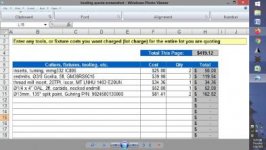[email protected]
Plastic
- Joined
- Apr 21, 2021
Question for shop owners. I am a new CNC job shop. Like many I started off with aluminum and soft steel. Now I am moving into SS like 304. My question is, got a job for 304 and I have to order tooling. Is it wrong to pass on the cost of tooling to the customer? It's just a couple of end mills designed for SS. I am worried that there might be a reasonable expectation for my customer to assume I have all tooling for his job. It should be noted that it's a large company feeling me out, and just purchasing the tooling for their small job puts me upside down unless I pass on the cost. Should I eat it in hopes of......?


